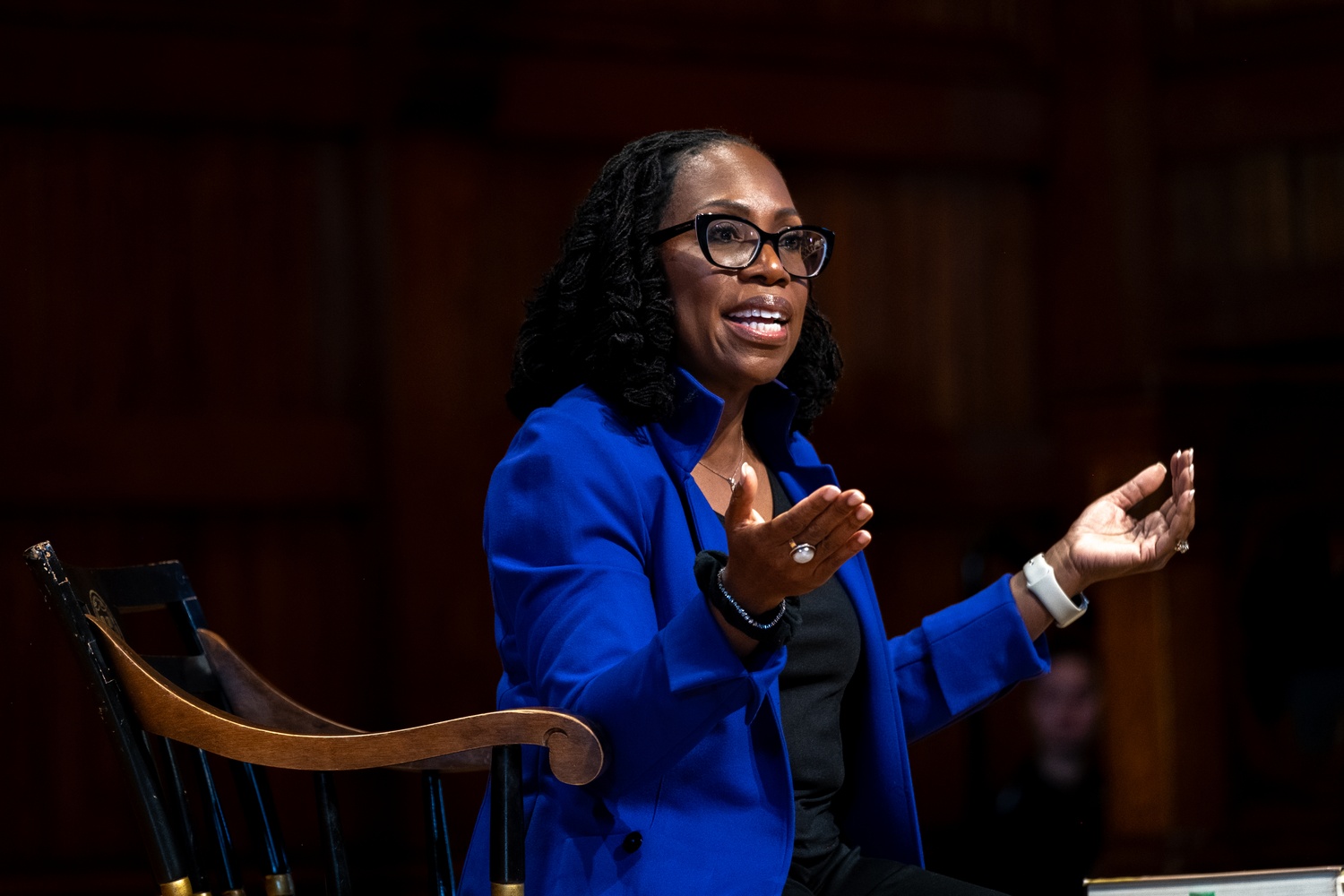
News
News Flash: Memory Shop and Anime Zakka to Open in Harvard Square

News
Harvard Researchers Develop AI-Driven Framework To Study Social Interactions, A Step Forward for Autism Research

News
Harvard Innovation Labs Announces 25 President’s Innovation Challenge Finalists

News
Graduate Student Council To Vote on Meeting Attendance Policy

News
Pop Hits and Politics: At Yardfest, Students Dance to Bedingfield and a Student Band Condemns Trump
Supreme Court Justice Ketanji Brown Jackson ’92 Judges Ames Moot Court Final at HLS

U.S. Supreme Court Justice Ketanji Brown Jackson ’92 presided over the final round of the Harvard Law School Ames Moot Court competition on Nov. 19., where a dozen students debated a mock appellate case on the Second Amendment.
The annual competition between Law School students concluded as a panel of high-profile justices — including Jackson, Judge Patti Saris ’73 of the U.S. District Court for Massachusetts, and Judge Joan Larsen of the U.S. Court of Appeals for the Sixth Circuit — traveled to campus to judge the students arguing the case.
The Ames Moot Court is a storied annual competition held at HLS since 1911, traditionally presided over by Supreme Court justices or prominent judges such as U.S. Attorney General Merrick B. Garland ’74. Last year, HLS students argued a case on administrative law before Jackson’s colleague, Supreme Court Justice Sonia Sotomayor. Chief Justice John G. Roberts ’76 and Justice Elena Kagan — a former HLS Dean — have also judged the competition in the past.
Before judging the competition, Jackson joined professor Michael Sandel in Sanders Theater for his flagship course GENED 1200: Justice, which she took as an undergraduate.
This year’s case, Daniel Welles v. John Doe, raised questions about the reach of Second Amendment protections and the government’s authority to regulate firearm possession for individuals without lawful residency status. Jackson and her colleagues on the bench questioned students on established precedents and recent similar Supreme Court cases.
The Constance Baker Motley Memorial Team, featuring team members Vaishalee Chaudhary, Sophia Kwende, Andrew B. Cogut, Elizabeth B. Buellesbach, Alexandra M. D. Taylor, and Alex E. Fredman, represented the respondent. The team won the “Best Overall Team” and “Best Brief” award.
The Sandra Day O’Connor Memorial Team represented the petitioner. The team was comprised of Arvind Ashok, Emily R. Malpass ’21, Edward R. C. Bless, Andrew M. Hayes, Richard D. Nehrboss, and Daniel F. Wasserman. Malpass won the “Best Oralist” award.
“This was an incredibly difficult decision,” Jackson said before announcing the winner, according to an HLS press release. “You made it very tough for us.”
In an emailed statement, Malpass wrote that her award was “a reflection of the time and effort that every member of the team poured into the competition.”
“Some of my favorite memories from law school will be the late nights spent working on the brief and the countless hours preparing for the argument with my team in the courtroom,” she added.
—Staff writer S. Mac Healey can be reached at mac.healey@thecrimson.com. Follow him on X @MacHealey.
—Staff writer Saketh Sundar can be reached at saketh.sundar@thecrimson.com. Follow him on X @saketh_sundar.
Want to keep up with breaking news? Subscribe to our email newsletter.
Most Read
- Harvard Kennedy School Revokes Fellowship to Human Rights Activist, Saying Offer Was Premature
- Harvard Asks Judge to Expedite Lawsuit Against Trump Admin, Declines to Request Emergency Injunction
- Amid Feud With Trump, Harvard Pushed Back Release of Antisemitism, Anti-Muslim Bias Task Force Reports From Early April
- As Deadline to Address DHS Letter Nears, Experts Say Harvard Should Sue — Again
- Khurana Says College Could Have To Make Sacrifices Amid Funding Freeze
From Our Advertisers

Over 300+ courses at prestigious colleges and universities in the US and UK are at your disposal.

Where you should have gotten your protein since 1998.

Serve as a proctor for Harvard Summer School (HSS) students, either in the Secondary School Program (SSP), General Program (GP), or Pre-College Program.

With an increasingly competitive Law School admissions process, it's important to understand what makes an applicant stand out.

Welcome to your one-stop gifting destination for men and women—it's like your neighborhood holiday shop, but way cooler.

HUSL seeks to create and empower a community of students who are seeking pathways into the Sports Business Industry.
